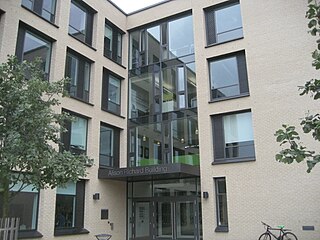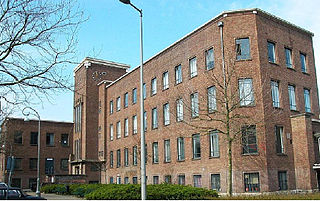Related Research Articles

Postgraduate education, graduate education, or graduate school consists of academic or professional degrees, certificates, diplomas, or other qualifications usually pursued by post-secondary students who have earned an undergraduate (bachelor's) degree.

Visual anthropology is a subfield of social anthropology that is concerned, in part, with the study and production of ethnographic photography, film and, since the mid-1990s, new media. More recently it has been used by historians of science and visual culture. Although sometimes wrongly conflated with ethnographic film, visual anthropology encompasses much more, including the anthropological study of all visual representations such as dance and other kinds of performance, museums and archiving, all visual arts, and the production and reception of mass media. Histories and analyses of representations from many cultures are part of visual anthropology: research topics include sandpaintings, tattoos, sculptures and reliefs, cave paintings, scrimshaw, jewelry, hieroglyphics, paintings and photographs. Also within the province of the subfield are studies of human vision, properties of media, the relationship of visual form and function, and applied, collaborative uses of visual representations.

A grant is a financial award given by a government entity, foundation, corporation, or other organization to an individual or organization for a specific purpose. Unlike loans, grants do not need to be repaid, making them an attractive source of funding for various activities, such as research, education, public service projects, and business ventures. Examples include student grants, research grants, the Sovereign Grant paid by the UK Treasury to the monarch, and some European Regional Development Fund payments in the European Union.
The Prince Claus Fund is an independent foundation dedicated to culture and development.
ART PAPERS is an Atlanta-based bimonthly art magazine and non-profit organization dedicated to the examination of art and culture in the world today. Its mission is to provide an independent and accessible forum for the exchange of perspectives on the role of contemporary art as a socially relevant and engaged discourse. This mission is implemented through the publication of ART PAPERS magazine and the presentation of public programs.

The Asian Cultural Council (ACC) is a non-profit organization dedicated to advancing international cultural exchange between Asia and the U.S. and between the countries of Asia through the arts. Founded by John D. Rockefeller III in 1963, ACC has invested over $100 million in grants to artists and arts professionals representing 16 fields and 26 countries through over 6,000 exchanges. ACC supports $1.4 million in grants annually for individuals and organizations.
The Getty Foundation, based in Los Angeles, California at the Getty Center, awards grants for "the understanding and preservation of the visual arts". In the past, it funded the Getty Leadership Institute for "current and future museum leaders", which is now at Claremont Graduate University. Its budget for 2006–07 was $27.8 million. It is part of the J. Paul Getty Trust.

Visual Communications –– is a community-based non-profit media arts organization based in Los Angeles. It was founded in 1970 by independent filmmakers Robert Nakamura, Alan Ohashi, Eddie Wong, and Duane Kubo, who were students of EthnoCommunications, an alternative film school at University of California, Los Angeles. The mission of VC is to "promote intercultural understanding through the creation, presentation, preservation and support of media works by and about Asian Pacific Americans."

The Centre for Research in the Arts, Social Sciences and Humanities (CRASSH) is an interdisciplinary research centre within the University of Cambridge. Founded in 2001, CRASSH came into being as a way to create interdisciplinary dialogue across the University’s many faculties and departments in the arts, social sciences, and humanities, as well as to build bridges with scientific subjects.

Antonio Jose Guzman is a Dutch Panamanian visual artist, communication designer and lecturer. He lives and works in Amsterdam, Panama City and Dakar.

doual'art is a non profit cultural organisation and art centre founded in 1991 in Douala, Cameroon and focussed on new urban practices of African cities.
Fahamu is a not-for-profit organization supporting organizations and social movements championing progressive social change and human rights. With branches in the United Kingdom, South Africa, Senegal, and Kenya, Fahamu primarily engages with civil and human rights organizations through Pambazuka News, an online platform focusing on social justice. Additionally, they offer online courses on human rights and social justice and employ new technologies, including SMS, for information dissemination, lobbying, and interactions.

Video Volunteers is an international NGO founded in 2003 that promotes community media to amplify citizen voice around the world. Video Volunteers is a registered non-profit in the state of New York in the US.

Hivos is an international cooperation organization, with its global office in The Hague, The Netherlands. Hivos provides support to civil society organizations working in Africa, Latin America, the Middle East and Asia. It is one of very few INGOs with a distinctly humanist ethos.

SMART Project Space was a publicly funded foundation for Contemporary Art founded in 1994 by the innovative cultural mediator Thomas Peutz. SPS closed its innovative exhibition programme in 2013, but remains a creative industries incubator, offering studio space to artists currently under the remit of SMART Estate Incorporation. Located in the old west of Amsterdam, SMART Project Space was a pioneering institution. It put the artist at the core of its programmes and sought stimulating and new relationships between the artist and the wider community. SMART commissioned, produced, and showcased some 70 contemporary visual art exhibitions, hosted hundreds of films, music and performance events, drawing together a wide range of creative approaches across disciplines.
The Walter Chapin Simpson Center for the Humanities, located in Seattle, Washington, is one of the largest and most comprehensive humanities centers in the United States. Housed in the College of Arts and Sciences at the University of Washington (UW), it offers UW scholars a spectrum of local opportunities for intellectual community and grant support that advances crossdisciplinarity, collaboration, and research while networking them nationally and internationally.

First Floor Gallery Harare is Zimbabwe's first contemporary emerging artist run gallery. The gallery is dedicated to supporting the professional and career development of the new generation of contemporary Zimbabwean artists locally and internationally. The gallery is also dedicated to education and audience development to ensure a sustainable future for career artists. As of 2011, the gallery has also been developing an artist in residence programme bringing senior international artists and scholars to work and exhibit with the gallery and young artists in Harare.
The SUD Salon Urbain de Douala is a triennial festival of public art and contemporary art organised in Douala, Cameroon. The festival had its first edition in 2007 and it is promoted by the art centre and cultural organisation doual'art.

AfriLabs is a pan-African innovation-focused organisation that works with over 400 innovation hubs in 53 countries and other stakeholders to raise successful startups and entrepreneurs that are developing and deploying innovative solutions to African problems through the adoption of technologies.
Project 1975 started in 2010 as a two-year project based in the Netherlands with the intent to explore the relationships between contemporary art and postcolonialism. Through this project Stedelijk Museum Bureau Amsterdam (SMBA) explored the role of art and visual culture in the context of colonial practices. The project consisted of multiple exhibitions, seminars, reading groups, articles, and a blog. "1975" in the title refers to the year that Suriname gained independence and the Netherlands thus became to some extent "postcolonial".
References
- ↑ Polly T. Stupples, Breaking the frame: Art in international development , Ph.D. thesis, Massey University, Turitea, New Zealand, 2011, pp. 56-57; Iolanda Pensa, La Biennale de Dakar comme projet de coopération et de développement , Ph.D. thesis, EHESS-Politecnico di Milano, 2011, pp. 150 and 295.